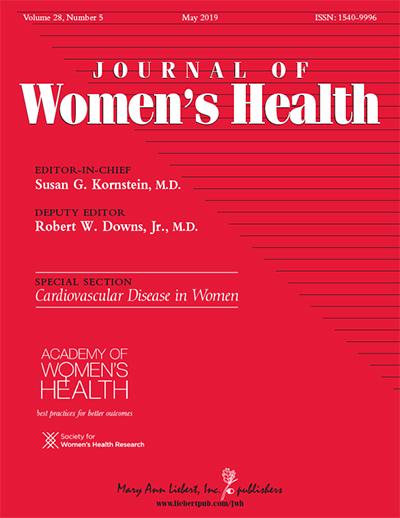
Credit: ©2012, Mary Ann Liebert, Inc., publishers
New Rochelle, NY, May 15, 2019–A new study has shown that more than half of physicians – primary care doctors and specialists – may be unaware that dense breasts are associated with an increased risk of breast cancer, and nearly half reported not being aware of laws requiring physicians to inform women about mammography-related breast density risks and supplemental screening options. This timely and newsworthy study, which also compared the knowledge and practices of primary care physicians to specialists regarding breast density, is published in Journal of Women’s Health, a peer-reviewed publication from Mary Ann Liebert, Inc., publishers. Click here to read the full-text article on the Journal of Women’s Health website through June 15, 2019.
Jordonna Brown, MBBS, MPH and a team of researchers from the Icahn School of Medicine at Mount Sinai, New York, NY coauthored the article entitled “Physician Knowledge, Attitudes and Practices Regarding Breast Density.” They found that compared to specialists, primary care physicians (PCPs) were less aware of the increased risk of breast cancer risk for women with dense breasts or their state’s breast cancer density laws. Breast density is both an independent risk factor for breast cancer and it can hide evidence of a breast tumor on routine mammographic screening. Most breast density laws refer patients to their PCPs to discuss their risks and options. Unfortunately, no established protocols are in place for screening women with dense breasts. Further complicating the issue, only some states mandate insurance coverage for supplemental breast imaging.
“Brown and coauthors found that two-thirds of the physicians in their study felt the need for more education about breast density, with this being true of 85% of the PCPs in particular,” says Susan G. Kornstein, MD, Editor-in-Chief of Journal of Women’s Health, Executive Director of the Virginia Commonwealth University Institute for Women’s Health, Richmond, VA, and President of the Academy of Women’s Health. “This represents a tremendous educational opportunity and one that could benefit a large number of women who are told they have dense breast tissue and face increased breast cancer risk.”
###
Research reported in this publication was supported by the National Institutes of Health under Award Number 1K07CA166462-01. The content is solely the responsibility of the authors and does not necessarily represent the official views of the National Institutes of Health.
About the Journal
Journal of Women’s Health, published monthly, is a core multidisciplinary journal dedicated to the diseases and conditions that hold greater risk for or are more prevalent among women, as well as diseases that present differently in women. Led by Editor-in-Chief Susan G. Kornstein, MD, Executive Director of the Virginia Commonwealth University Institute for Women’s Health, Richmond, VA, and President of the Academy of Women’s Health, the Journal covers the latest advances and clinical applications of new diagnostic procedures and therapeutic protocols for the prevention and management of women’s healthcare issues. Complete tables of content and a sample issue may be viewed on the Journal of Women’s Health website. Journal of Women’s Health is the official journal of the Academy of Women’s Health and the Society for Women’s Health Research.
About the Academy
Academy of Women’s Health is an interdisciplinary, international association of physicians, nurses, and other health professionals who work across the broad field of women’s health, providing its members with up-to-date advances and options in clinical care that will enable the best outcomes for their women patients. The Academy’s focus includes the dissemination of translational research and evidence-based practices for disease prevention, diagnosis, and treatment of women across the lifespan.
About the Publisher
Mary Ann Liebert, Inc., publishers is a privately held, fully integrated media company known for establishing authoritative peer-reviewed journals in many promising areas of science and biomedical research, including LGBT Health, Transgender Health, Population Health Management, and Breastfeeding Medicine. Its biotechnology trade magazine, GEN (Genetic Engineering & Biotechnology News), was the first in its field and is today the industry’s most widely read publication worldwide. A complete list of the firm’s 80 journals, books, and newsmagazines is available on the Mary Ann Liebert, Inc., publishers website.
Media Contact
Kathryn Ryan
[email protected]




